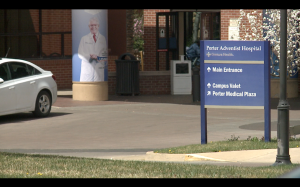DENVER — A massive lawsuit filed against Porter Adventist Hospital over its failure to sterilize medical instruments suggests there are many more patients who might’ve been affected than the 5,800 patients who received warning letters in 2018.
In an agreement with the Colorado Department of Health and Environment, Porter Adventist Hospital only notified spine and orthopedic patients who underwent surgeries between July 2016 and April 2018 that they might have been at risk for contracting HIV, Hepatitis or a surgical site infection.

But attorneys with the firm Denver Trial Lawyers tell FOX31 there is reason to believe patients may have received infections as early as February 2015 and into the summer of 2018.
“It appears that Porter Hospital, despite being required to report its infection rates and problems with in its sterilization unit, was failing to report to the Department of Health,” said attorney David Woodruff, who filed suit Saturday on behalf of 66 patients and 19 spouses.
Documents shared with the Problem Solvers show that according to Porter Adventist Hospital’s own data, it performed 14,805 surgeries during the period in which contamination issues were known to have existed. But again, only 5,800 patients received warning letters; more than 9,000 patients who had surgery during the same period did not.
“So we already represent more infected patients than Porter even admits. It’s real hard to know how many more are out there but I would guess hundreds,” said Woodruff.

Michelle Coleman is one the former patients who did receive a notification letter.
“I was livid,” said the 47-year-old Aurora mom. Coleman had gone to Porter Adventist Hospital for spine surgery after breaking her neck in a fall. Doctors told her she had a 3% chance of surviving and 95% chance of paralysis if she did survive. She beat both of those odds only to develop a serious infection in her neck, where doctors performed her surgery.

“I want accountability. I want people to be safe. You shouldn’t go in for surgery or any type of procedure questioning whether the surgery equipment is contaminated,” said Coleman.
But at least Coleman knew to get tested for a blood borne pathogen after receiving her notification letter.
Denver man Shawn Hand, 53, received no such letter because he was a heart patient during the time in question.
“The hospital stated that I was within 3 hours of passing away when I was brought in,” said Hand. He developed a heart infection weeks after going to Porter Adventist Hospital for open-heart surgery.
“I thought I was going in for a normal open-heart surgery to have my aortic valve replaced and I had no idea that I was walking into a nightmare,” said Hand, who is now on disability and can no longer work, a result he said of his infection.
Hand would eventually lose his gallbladder and walks with a limp because he said the infection led to paralysis on his left side. Plus, he now wears a Life Alert necklace just in case he falls or feels he’s about to faint.
“It’s inhuman to take someone’s life and their family and just play a lottery with them. It really is,” he said.
Porter Adventist Hospital was forced to close its operating room for about a week in April 2018 after state and federal health investigators discovered widespread issues of contamination with medical instruments that hadn’t been properly sterilized.
The hospital has been operating with a conditional license from the state of Colorado since September 2018.

Porter Adventist Hospital released a statement to FOX31 that reads:
“We acknowledge the concern of these patients and are aware of existing lawsuits stemming from a review by CDPHE of the pre-cleaning process of surgical instruments prior to sterilization which was identified in February 2018. To protect the privacy all involved, we will be addressing this matter through the legal process which is underway. As an outcome of the CDPHE investigation, we continue to provide reports to CDPHE that confirm Porter Adventist Hospital continues to meet the sterilization process guidelines of CDPHE.”

The Colorado Department of Health and Environment released a statement on behalf of Tista Ghosh, the chief medical officer and director of public health programs.
“There are numerous factors that can contribute to a surgical site infection, and it’s not always possible to draw a direct cause and effect. That is why were not able to definitively determine links between infections and the infection control breach. It is, however, absolutely critical to have sterilized surgical tools. As the result of our 2018 investigation, Porter was placed on – and continues to be on – a conditional license, requiring corrective action.”
A spokeswoman for CDPHE told FOX31 the health department only recommended Porter notify orthopedic and spine surgery patients because that is where the investigation revealed concerns. Orthopedic and spine surgeries use separate tools, rooms and staff than other surgeries.
